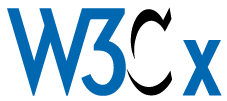Success of First W3Cx MOOC HTML5 Course Drives Demand for New Courses
W3C introduces an HTML5 XSeries Program on edX
https://www.w3.org - 30 September 2015 — Building on the successful results of the first W3Cx HTML5 MOOC (Massive Open Online Course) course, the World Wide Web Consortium (W3C) announced today that it will strengthen its online course offerings on edX with two more HTML5 courses and an XSeries Program dedicated to HTML5 at an intermediate level.
“With tens of thousands of learners enrolled from all over the world, W3C’s first HTML5 MOOC was hugely popular with edX learners,” said Anant Agarwal, CEO, edX. “The success of our partners such as W3C has helped edX achieve the milestone of five million learners engaged with the edX community around the world.”
“Response to the W3Cx HTML5 Part 1 MOOC course was phenomenally positive with over 87,000 participants from nearly 200 countries,” said Marie-Claire Forgue, Director of Training at W3C. “I am pleased to announce that we will offer HTML5 Part 1 again, which is currently open for enrollment and begins on October 5th. HTML5 Part 2 will start on December 1st 2015. This pairing will enable participants to earn an XSeries Program Certificate from edX and W3Cx.”
On the edX platform, an XSeries Program is a sequence of courses designed to build mastery of a specific area of study. The HTML5 XSeries Program Certificate will recognize the accomplishments of participants and help advance their professional careers to stay ahead of industry trends. With the HTML5 XSeries Program, the new HTML5 features can be addressed in depth through the MOOC format.
Taught by Michel Buffa, Professor at the University of Côte d'Azur (UFR Sciences), the W3Cx HTML5 courses enable participants to master HTML5 features, powdered by tips and best practices meant to hone Web development skills. The HTML5 Part 1 course explains the essential HTML5 features and HTML5 Part 2 covers advanced topics to help developers design and deliver innovative services on the Web. Read the “Learn HTML5 from W3C” XSeries program description for more information.
W3C developer engagement commitment
The W3Cx courses represent one of several key pillars of W3C’s commitment to developer engagement, training and community building.
W3C has been developing and hosting open-source tools used every day by millions of Web developers and Web designers for more than 15 years. W3C offers free Community Groups for pre-standard technical discussions, hosts meetups, conferences and events globally. The next W3C Developer meetup will be held in Sapporo, Japan, during TPAC 2015 (Technical Plenary / Advisory Committee Meetings Week), the popular event W3C organizes annually for its membership.
W3C CEO Dr. Jeff Jaffe will present a keynote on W3C’s education and open development strategies at the Open edX annual conference, October 12-13, 2015 in Wellesley, MA, USA. He will describe why open Web standards are critical to the success of the Web and in making the Web a free, open and accessible environment for sharing knowledge.
About the World Wide Web Consortium
The World Wide Web Consortium (W3C) is an international consortium where Member organizations, a full-time staff, and the public work together to develop Web standards. W3C primarily pursues its mission through the creation of Web standards and guidelines designed to ensure long-term growth and stewardship for the Web. Over 400 organizations are Members of the Consortium.
W3C is jointly run by the MIT Computer Science and Artificial Intelligence Laboratory (MIT CSAIL) in the United States, the European Research Consortium for Informatics and Mathematics (ERCIM) headquartered in France, Keio University in Japan and Beihang University in China. W3C has Offices in Australia; the Benelux countries; Brazil; Finland; France; Germany and Austria; Greece; Hungary; India; Italy; Korea; Morocco; Russia; Southern Africa; Spain; Sweden; and the United Kingdom and Ireland. For more information see http://www.w3.org/
Media Contacts
For W3C, Karen Myers <karen@w3.org>
For edX, Rachel Lapal <rlapal@edx.org>
